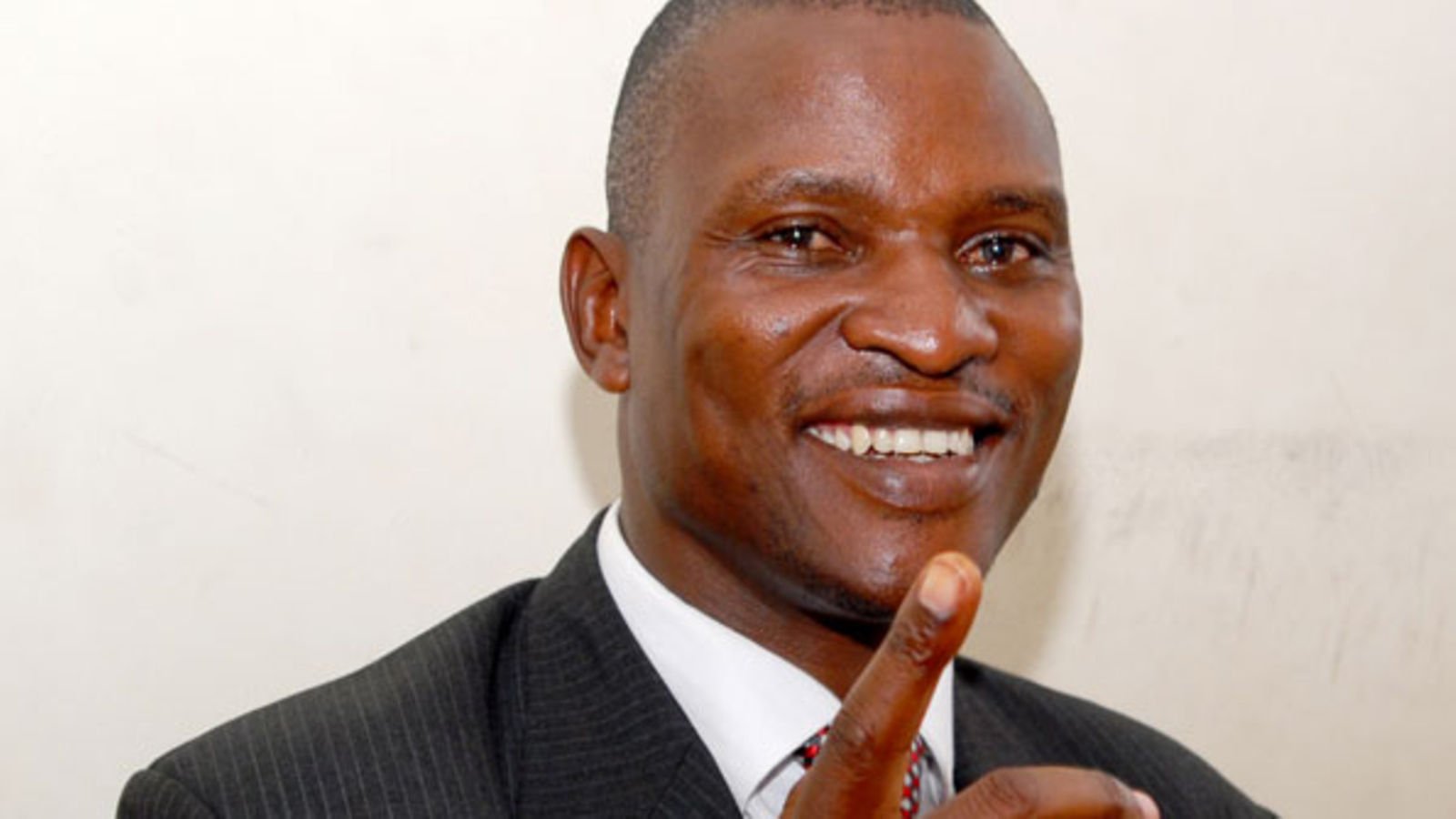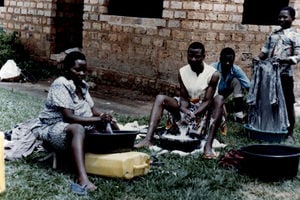
The late Joseph Tamale Mirundi during a press briefing at Uganda Media Centre. Photo | File
Joseph Tamale Mirundi, a former journalist and Presidential Press Secretary, led a life as multifaceted as a chameleon but never wavered in his outspoken nature.
Mirundi, who passed away at 60 after battling liver and lung issues at Kisubi Hospital on Tuesday, was known for his ability to adapt to any situation, using his sharp tongue to attack foes and praise friends alike.
Born on June 30, 1964, in Matale-Kalagala, Kyotera District, Mirundi was a controversial figure in the media, creating both allies and enemies.
He often reflected on his childhood, describing it as joyful yet stubborn. He recounted how, as a child, he once pushed down a Catholic priest during a baptism ceremony in a packed church, a testament to his early defiance.
Mirundi excelled academically, particularly in music and English, and was selected to sing in the school choir that performed for former President Idi Amin Dada during a visit to their district in the 1970s.
His older brother, John Ssali, played a pivotal role in his life, relocating him from the village to Kampala for better educational opportunities.
“When my wife joined me in Kampala City, she informed me that my brother (Mirundi) was very good in class, but he was so stubborn. She said if Mirundi remained in the village, he was going to fail in life. So she suggested that we bring him to Kampala City to save his life. I agreed,” Mr Ssali said.
After completing his primary education, Mirundi joined Lubiri Secondary School, where he pursued both his Ordinary and Advanced levels of education. It was during this time that his brother, who worked for Munno newspaper, helped him secure a job as a vendor for the publication. Mirundi quickly gained an understanding of street life, often saying that selling newspapers during school holidays and while still a student was an invaluable experience.
While vending newspapers, Mirundi began writing and submitting news stories to Munno’s editors, who appreciated his contributions. This sparked his passion for journalism, leading him to abandon formal education in favor of news reporting, a decision that would shape his career. He often referred to himself as a self-made man, having learned the ropes of journalism through apprenticeship and in-house training provided by the Catholic Church at Munno.
Mirundi’s career blossomed during a tumultuous period in Uganda’s history, marked by frequent government changes and the rise of the National Resistance Movement (NRM) in the early 1980s.
His reporting allowed him to establish connections with both government officials and rebel leaders, including Yoweri Museveni and his brother, Caleb Akandwanaho, also known as Gen. Salim Saleh. These relationships would prove invaluable when the NRM took power, with Museveni becoming President and Saleh a top military general.
Veteran journalist John Kakande, who first met Mirundi in 1986 while working for the Star newspaper, recalled their friendship and professional rivalry.
“We had a chat, and I discovered that he was staying in my neighborhood. He had an independent mind. He used to have a column in Munno newspaper, which was aggressive. He was known for asking provocative questions [during press conferences],” Mr Kakande said.
Mr Kakande also recounted an incident in Luweero District where Mirundi outmaneuvered him by capturing a key news angle.
“One time I covered a story with him at an event in Luweero District, and the late Kisamba Mugerwa stated that government donations to the people affected by the war never reached the targeted groups. Tamale wrote the story, but I missed that news angle,” Mr Kakande admitted.
The story turned out to be significant, as it implicated former Prime Minister, the late Dr Samson Kisekka, in the mismanagement of relief items for war victims.
Mirundi was also an advocate for journalists’ rights.
Mr Stephen Bwire Ouma, the Secretary General of the Uganda Journalist Union, recalled how Mirundi stood up for journalists during a State House press conference in the late 1980s.
“We were invited to the State House, Entebbe, to cover a press conference by President Museveni. Then we found that our seats had been occupied by other people. We were supposed to stand during the interview. Mirundi led us in a walkout protest. The then Information Minister, the late Kintu Musoke, ran after us up to the State House gate and pleaded with us not to leave,” Mr Ouma said.
The journalists’ rights were respected before they returned to the conference.
Mirundi’s determination to uphold the rights of journalists earned him the position of Secretary for Labour of the Uganda Journalist Association (UJA) from 1991 to 1994, despite lacking formal journalism qualifications.
He later became the founding chairman of the Uganda Journalists Union. Mr Ouma recalled how Mirundi frequently used press conferences to confront the government on journalists’ rights violations.
“Mirundi once asked President Museveni why they arrest journalists on Friday to keep them in police cells over the weekend. President Museveni promised that journalists would only be arrested on Monday to enable them to get bail,” Mr Ouma said.
As a journalist, Mirundi was known for his fearless questioning, once asking President Museveni for a deadline to defeat the Lord’s Resistance Army (LRA) rebellion led by Joseph Kony.
“Mirundi went to an extent of betting with the President that he wouldn’t defeat Kony in the deadline set. The President didn’t defeat Kony within the set deadline,” Mr Kakande said. President Museveni lost a Shs1 million bet to Mirundi.
Despite his contributions to journalism, Mirundi faced criticism for his management style when he ventured into media entrepreneurship.
After leaving Munno newspaper, he established his own publication, Lipoota, which was praised for its investigative stories but criticised for poor working conditions.
Mr Felix Kyeyune, a relative and former colleague, recalled: “Mirundi often told journalists that he couldn’t provide you with a platform to work and also pay you.” Lipoota folded before its fourth anniversary.
In 1998, Mirundi was elected President of UJA, but his confrontational approach often put him at odds with the government. His opposition to the proposed Press and Journalism Statute of 1995, which sought to regulate the media and restrict journalism to graduates, was particularly notable. Veteran journalist Haruna Kanaabi praised Mirundi for his leadership in rallying against the law, which ultimately failed to pass in its intended form.
“He was one person with whom we rallied against the law. He was our leader. He used his union background and training to fight the law, which was a stumbling block to the media practice,” Mr Kanaabi said.
Mirundi’s career took a turn when he joined Uganda Television (UTV) as a panelist on a political talk show hosted by Henry Ford Mirima. Although the show aired on a government-run station, Mirundi did not shy away from criticizing government policies. During one episode, he declined to encourage Ugandans to buy locally made products, stating: “I can’t buy a poor quality product from a person because he or she is my neighbour. No. I can’t. I would rather send my child to go to a shop, which has quality products, far away.”
The show was eventually cancelled, but Radio Simba soon tapped into its popularity by recruiting Mirundi as a panelist for its talk show, “Gasimbagane ne Banamawulire.” Simultaneously, Mirundi launched his own newspaper, Lipoota, which published both Luganda and English stories. Despite its initial success, the publication folded within a few years due to financial challenges.
However, the President offered him a scholarship at Makerere University to study a degree in Mass Communication.
In 2004, President Museveni appointed Mirundi as his Deputy Press Secretary, a position he accepted despite his earlier vows never to take a government job. When asked why he had changed his mind, Mirundi responded: “Did I go to school and get a degree to be unemployed? Do you think I was educated for nothing? Those who thought that an educated person like me can’t take one of the best jobs in the country are stupid.”
Mirundi’s new role brought him closer to the center of power, but it also placed him in precarious situations, such as during the 2009 Buganda riots when he had to flee for his life. His mother, living in Kyotera, was also threatened by protesters.
“I called the President to save my mother. He sent commandos that rescued my mother and our property,” Mirundi said.
Mirundi’s aggressive debating style often led to physical confrontations during radio shows. He was involved in several altercations, including a fist-fight with Ahmed Kateregga, a fellow panelist, and an incident where he allegedly pulled a pistol on veteran journalist Siraje Lubwama during a talk show. He also faced criticism for using his platform to attack government officials and was accused of appearing drunk on air, which he denied.
In July 2015, President Museveni dismissed Mirundi as his spokesperson, but offered him a position as a Senior Advisor on Media. Mirundi declined to occupy the office, though he continued to receive a salary and benefits.
Following his dismissal, he became increasingly critical of the government, accusing various officials of orchestrating his ouster. On one occasion, he brandished a panga during a live talk show, threatening his critics.
With traditional media increasingly distancing itself from him, Mirundi turned to online platforms, where he continued to share his views, often while drinking alcohol. He remained active in online media until his death.
Mirundi is survived by several wives and more than 14 children. He will be buried on Sunday in Kyotera District.



